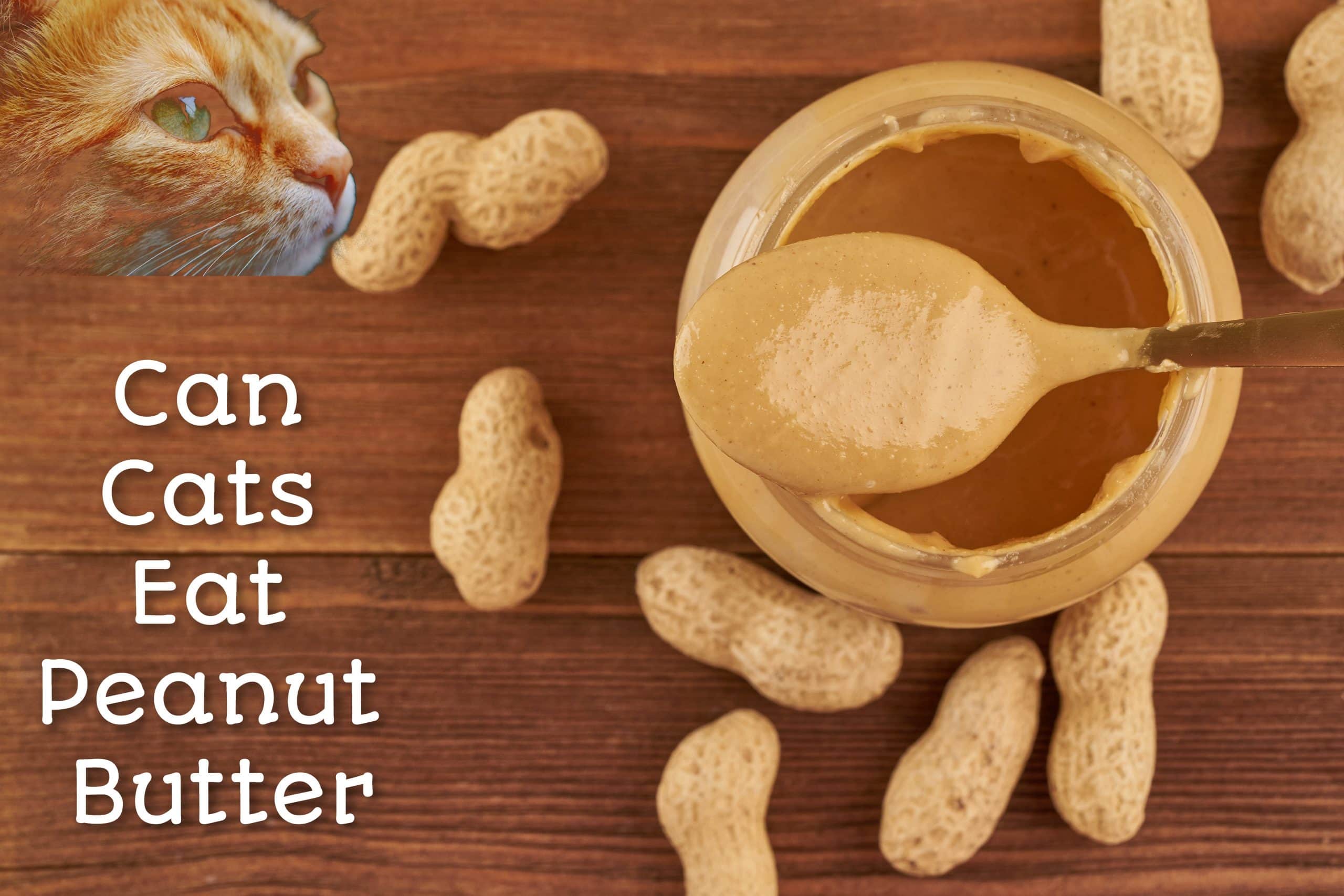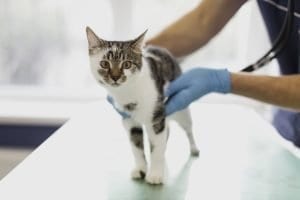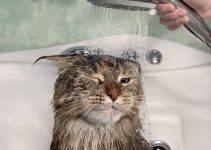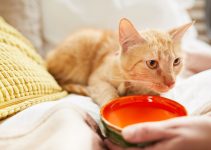Our cats are lovely creatures who seek treats very often. There are many cat foods treats, such as dry kibbles, for example, cooked chicken baits, some tuna, and many more, however, our cats sometimes tend to try our human food. Some of that human food could be good and even very beneficial for our cats, other foods could be toxic, and some other might be delicious, harmless, but free of healthy nutrients for your cat.
You can notice that your cat would sometimes lick the leftovers of your peanut butter sandwich, or lick the spoon you used, or even jump on your peanut butter sandwich and take it as its treat.
It is well known that many cats enjoy eating peanut butter, and also love it, however, is peanut butter healthy for cats? Can cats eat peanut butter? Is peanut butter toxic for your cat? Moreover, does peanut butter contain any nutrients that could help your cat grow healthy?
NOTE: We want to inform our blog readers that before we publish any article, the team “Proudcatowners” does deep research based on experience and knowledge about cats and everything related to them, to guarantees reliable and precise information, satisfy the readers is our first priority.
Can cats eat peanut butter?
Since cats are carnivores, they get all the nutrients they need from the diet, which is based mostly on different types of meat. Therefore, you should not feed them peanut butter, technically.
However, it is still okay to give your cat small amounts of peanut butter every once in a while. It is safe, as long it is presented in moderation, and not excessively. Peanut butter is not listed on the ASPCA’s list of human foods that are toxic for cats, so it is technically safe.
You should keep in mind that your cat is already getting all the nutrition it needs from its dry cat food, wet cat food, or other food diets such as homemade meals or raw meat, for this reason, you do not need to add any other supplements such as peanut butter to its diet.
According to Dr. Dale Rubenstein, cats do not process other foods that are new to their diet type well. Giving your cat peanut butter would be because your cat is craving it or wanting to lick the back of the spoon, for example, but ever as a dietary supplement.
How do I know which human food is toxic for my cat?
Many foods are toxic for cats, there are general ones that you can find online, and there are others which can be specific to your cat only because of allergies or a sensitive stomach. But here is a list of some of the toxic human foods for your cat:
- Garlic
- Onions
- Chocolate
- Grapes
- Raisins
- Milk and other dairy products
- Raw dough
- Alcohol
What are the health benefits of peanut butter on my cat?
Peanut butter is high in fats, but it lacks protein and minerals. Therefore, it does not have any noticeable health benefits on your cat. Feeding your cat peanut butter would not improve its growth or help with its coat. Feeding peanut butter to your cat is the same as not feeding it at all.
Does peanut butter have any nutritional values for my cats?
Generally speaking, peanut butter does not have any nutritious aspects to your cat; it does not add any positive things or ingredients to the cat’s diet. Cats are carnivores, and their diets are based on mostly protein, which they get from meats and fish. Although peanut butter is high in fats, it does not have any nutritional value to add to your cat’s diet or your cat’s health, because it does not contain the essential vitamins and mineral which your cat’s body require and need daily.
How much peanut butter can a cat have?
Nutritionally speaking it does not have any added value to your cat’s diet, you might wonder why would I feed my cat peanut butter, instead of asking can cats eat peanut butter. If you choose to allow your cat to have it, peanut butter should be fed on rare occasions, and in a reasonable manner. A spoonful is considered too much and could lead to your cat’s choking eventually because of the texture of peanut butter. Many veterinarians and animal nutritionists advise pet parents that they should not feed their cats peanut butter overall unless they are using it to give their cats medications.
Allowing your cat to lick some leftovers on the spoon, or allowing to lick a fingertip dipped in peanut butter is okay; however, it is better to avoid it; unless you need it for an urgent matter, such as using it as a medium to give your cat its medications. Too much peanut butter would lead to serious health issues with your cat; therefore, a small taste that pleases your cat is not worth the risk of complications in your cat’s health over it.
Consequences of feeding your cat too much peanut butter:
Since peanut butter does not provide any extra nutrition or health benefits for your cat, the risks of peanut butter are more than its benefit for your cat.
If your cat consumes peanut butter very often, or it eats large amounts all at once, it might develop digestive problems. These digestive issues can either be elementary, while at times, they can be severe. Here are some of the signs of a gastrointestinal problem:
Vomiting:
This could be due to an upset stomach from peanut butter or hypersensitivity from a specific ingredient, which leads to vomiting. If your cat is experiencing vomiting, usually, it is advised that you restrict any food for it from 12 hours up to 24 hours. If your cat’s vomiting continuous for several days, you should see a doctor immediately to diagnose the reason for the problem.
Diarrhea:
If your cat has an intestinal inflammation, diarrhea is usually a quite common symptom. It can be due to many reasons, the cat’s diarrhea can differ in form, it can either be watery or in the form of mucus, depending on what is causing it. If your cat’s diarrhea continues even after you stop giving it peanut butter, you should see a veterinary immediately, especially if your cat is displaying other symptoms such as blood in their poop in cases of diarrhea.
What should I do if my cat has diarrhea because of peanut butter?
After you settle your question of can cats eat peanut butter, you should check your cat’s allergies before feeding it a peanut butter snack. If your cat has an allergic reaction to peanut butter, such as diarrhea, for example, avoid giving it any human antibiotics or other allergy medications, because they are toxic to cats. Call a veterinarian for medical advice, or stop providing your cat with food for the next 8 to 12 hours. You can also give your cat probiotics that were proven to help with diarrhea in cats. If diarrhea continuous for several days, make sure you see a veterinarian for proper medical care.
Your cat can also experience stomach pains, weight loss, increased or decreased thirst, dry and dull coat, in addition to gas. Due to the fats and carbohydrates in peanut butter, your cat could end up developing diabetes as well, in addition to becoming obese. These two would lead to other health conditions and complications that might put your cat’s life at risk.
High levels of calories:
It is a common fact that peanut butter is very rich in calories, which might not be the best choice for your cat. Since cats already get all they need from their diets, which are based on meat and fish, excessive amounts of calories would pose a problem more than a health benefit. If your cat is one of the cats who are already chubby or struggle with weight, peanut butter is something you should avoid giving to your cat. Even though many people think that chubby cats are cute, but that could lead to severe health conditions and put your cat at risk.
Unhealthy and harmful fats:
Peanut butter is known to last long on a shelf before it goes bad, due to manufacturing fats in it, two tablespoons of it contain
16 g of fats. Since it is manufactured using trans fatty acids to help store longer on a shelf, this causes a health issue to your cat, because those fats are hazardous and are considered as a significant toxic food substance.
You can notice these fats if the peanut butter is manufactured with partially hydrogenated vegetable oil. It is best to keep these trans fatty acids as far away from your cat’s diet as possible, for the sake of its health.
Risk of chocking:
Because of its texture, your cat might be at risk of choking. Peanut butter is very sticky and thick as well, this could lead to it being stuck in your cat’s throat instead of going down smoothly. You might think that this could only happen if you give your cat a spoonful of peanut butter, which he cannot handle, but in fact, even a small amount can put your little paw friend at risk of a choking hazard.
If you choose to give your cat some peanut butter for a treat or a quick snack, make sure you monitor your cat closely in case anything goes wrong. In addition to that, make sure your cat always has access to fresh and clean water in sufficient quantities; in case it needs help to wash the peanut butter down its throat.
Peanut butter and aflatoxins:
Aflatoxin is a toxic metabolite that occurs naturally, and it is produced by a specific fungus, the Aspergillus flavis. This mold colonizes peanuts underground, and it can be found on food products like peanuts, corn, and peanut butter. Peanuts especially are full of these naturally occurring Aflatoxins, which makes peanut butter even a riskier treat for your cat.
What are the risks of Aflatoxins on my cat?
It has been proven that many severe diseases such as aflatoxicosis and cancer are due to Aflatoxins. In the case of cancer, it has been confirmed that mycotoxins are one of the main cancer-causing matters in this field, and Aflatoxins are a type of mycotoxin. Aflatoxins are also extremely toxic for the liver and can lead to the damage of your cat’s liver or even liver cancer.
The USDA, United States Department of Agriculture, usually supervises such matters and monitors foods related to this to make sure that amounts of these aflatoxins in foods are below the recommended levels.
Can cats have an allergic reaction to peanut butter? Or develop allergies?
It is known for cats to develop food allergies; they can either develop it with time or are already born with an allergy to one or more food ingredients. There is a possibility that your cat could have an unknown allergic reaction to peanut butter once you feed it. As much as peanut butter allergy can be threatening to humans, it can also be very lethal and life-threatening to your cat.
Peanut butter allergic reactions can escalate quickly and put your cat’s life at risk. Therefore, you must be able to recognize the symptoms as they start and take immediate action. Any delay would be risking your cat’s life even more.
If you notice any of the following symptoms after your cat has consumed peanut butter, make sure you call a veterinarian to tell you how to act, or to go to a pet hospital as soon as possible. These symptoms or allergic reactions can be mild such as skin irritation. Still, they can also grow to be life-threatening for your cat.
Common symptoms of peanut butter allergy:
- Severe itching
- Chronic ear infection
- Hair loss
- Bald spots
- Skin irritation
- Diarrhea
- Vomiting
- Loss of appetite
- Weight loss
Digesting toxins by accident:
Since you already know that many cats love the taste of peanut butter, you should also know that they are not the only animals who do.
There are some rodents as well who adore the taste. Therefore, many companies make their anti-insects and rodent poisons using that flavor.
If you have a rats problem in your household, and you put a trap to get rid of them, make sure you are careful with what is in that poison, and keep your cat as distant as possible from it because it might mistake it for a treat and end up eating it.
What should I do if my cat eats rat poison?
If you suspect your cat has consumed any poison, make sure you rush it to the veterinarian immediately. Poisoning can be extremely lethal to cats if it is not attended to promptly. And before you use any pest control products, read the ingredients and try to avoid anything that can confuse your cat or put it at risk, such as peanut butter flavors.
What should I do if my cat overeats peanut butter?
Just like humans can get gastrointestinal issues if they overeat peanut butter, the same thing can happen with cats. If your cat eats peanut butter and starts showing some of the symptoms mentioned above, make sure you take away peanut butter from them and deprive them of food for about 12 hours, in addition to providing them with constant access to fresh water. If the symptoms do not go away on their own after a short while, or they escalate to more severe symptoms, make sure you consult you a veterinarian for medical advice and care.
Should I give my cat peanut butter from time to time?
It is better to avoid peanut butter since it does not have any nutritional value. In addition to that, the risks of feeding your cat peanut butter are more than its benefits, and it is not worth putting your cat through that risk. Many vets and cat parents advise others that it is best to avoid peanut butter entirely. Giving your cat peanut butter makes the fats and carbohydrates build-up, which could lead to obesity and diabetes in your cat.
How can I include peanut butter in my cat’s diet in a healthy way?
A small amount of peanut butter from time to time would usually not harm your cat. The healthiest way to use peanut butter with cats is by using it to trick your cat into taking its medications. As the general rule goes, pet owners should not feed their cats peanut butter unless it is for medical use.
Can I give my cat peanut butter and jelly treats?
When you are having a small snack of peanut butter and jelly on toast, your cat might come up to you and try to lick some of it. Since peanut butter and toast are not toxic to your cat, it is okay to share your snack, but be careful of how much you allow it to take. However, it is still advised against giving your cat peanut butter.
Can I give peanut butter dog treats to my cat?
If you give your cat dog treats occasionally, it will not hurt them to enjoy it from time to time. However, if you persist on this, and give your cat too much peanut butter dog treats or dog nibbles, for example, or give them these treats too often, this would lead to health issues with your cat, and it would become malnourished.
Precautions concerning peanut butter and cats:
Sugar replacements: Xylitol
Over the last years, people have become more cautious about sugar levels, and there was a new health craze concerning anti-sugar diets. Many people started following No-sugar diets, or avoiding all foods with artificial sweeteners; as a consequence, many food companies opted for sugar replacement in their products.
This replacement is called Xylitol. Many brands that produce peanut butter adopted the same thing and started using Xylitol in their products instead of sugar, which is considered a negative aspect to your cats.
Xylitol is extremely toxic and lethal to animals, cats included. This led to several tragedies of pet parents losing their cats, dogs, or other animals, due to poisoning, because they did not know those brands were replacing sugar in their products with Xylitol.
In case you decide to give your cat peanut butter treats, make sure you check the ingredients of that brand and avoid products that contain Xylitol entirely. Here are some of the peanut butter brands which do not contain Xylitol in their formula:
- Go Nuts, Go
- Krush Nutrition
- Nuts Nutrition
- Nuts ‘N More
- P 28 Foods
- Protein Plus PB
You should be careful concerning other foods as well. Peanut butter brands were not the only ones who substituted sugar with Xylitol, so make sure you check the ingredients on the label before serving any kind of food for your cat.
Excessive sugar intake:
Many foods contain excessive amounts of sugar, and so dome some peanut butter brands. Too much sugar can encourage some cat diseases, and even lead or invoke other health conditions such as diabetes, obesity, premature aging, inflammatory changes in your cat’s body.
Some infections are encouraged by high sugar intake:
- Yeast infection
- Bacterial infection
- Parasites
Too sweet is bad, and so is salty!
If you choose to give your cat peanut butter from time to time, you should make sure that the brand you are using does not have any salt additives. High sodium levels in your cat’s food cat evoke many health issues in your little paw friend’s body. It is best to search for unsalted peanut butter brands when it comes to your cat’s diet, it can be a bit challenging to find, but "better safe than sorry".
Are peanuts healthy for cats?
Peanuts, just like peanut butter, are not toxic to cats, but they should also be given occasionally only. Before you offer your cat any peanuts as a treat, make sure they are raw and unsalted. Cats’ digestive system is not built to handle too many additives. In addition to that, keep an eye on your cat, and beware of nuts allergies.
Other alternative snacks for your cats:
- Green bell peppers
- Spinach
- Carrots
- Zucchini
- Pumpkin
NOTE: pumpkin can be used to ease diarrhea in your cat
- Peas
- Broccoli
- Celery
Conclusion:
Although our cats are always eager to try human treats, some of them can be unhealthy or do not have any nutritional value, such as peanut butter.
Peanut butter is not considered toxic for cats. However, it does not add any health benefits to your cat’s diet, and it might put your cat at some risks like chocking, diarrhea, and gastrointestinal issues. In addition to that, there are some pest control products which are peanut butter flavored, and this could lead to accidental poisoning in your cat if it eats it by mistake.
Just like humans can suffer from peanut butter allergies, cats can also develop those kinds of allergies towards peanut butter or peanuts. These allergic reactions can vary from mild to severe and lethal in some cases.
Peanut butter also contains many unhealthy fats, which can invoke diabetes and obesity in your cat. Some food companies started replacing sugar in their products with Xylitol, which is a toxic sugar substitute for cats. In case you decide to give your cat peanut butter, make sure you check the label for ingredients and avoid any brands which contain Xylitol, additives like salt, or excessive sugar amounts.
There are other healthy snacks you can give your cat instead of peanut butter, such as spinach, carrots, zucchini, and pumpkin. This latter can also help with your cat’s diarrhea. It is best to avoid giving your cat peanut butter unless it is to help with giving it medications. If you notice any symptoms or suspect that your cat has consumed rodent poison, make sure you seek immediate medical care.








